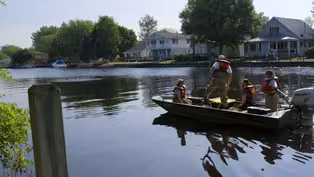Pressing Matters
Artificial Intelligence in the Classroom
Clip: Season 1 Episode 1 | 6m 55sVideo has Closed Captions
Artificial Intelligence in the Classroom
Artificial Intelligence in the Classroom
Problems playing video? | Closed Captioning Feedback
Problems playing video? | Closed Captioning Feedback
Pressing Matters is a local public television program presented by WCMU
Pressing Matters
Artificial Intelligence in the Classroom
Clip: Season 1 Episode 1 | 6m 55sVideo has Closed Captions
Artificial Intelligence in the Classroom
Problems playing video? | Closed Captioning Feedback
How to Watch Pressing Matters
Pressing Matters is available to stream on pbs.org and the free PBS App, available on iPhone, Apple TV, Android TV, Android smartphones, Amazon Fire TV, Amazon Fire Tablet, Roku, Samsung Smart TV, and Vizio.
Providing Support for PBS.org
Learn Moreabout PBS online sponsorshipIt's the middle of summer.
But inside this classroom at Central Michigan University are K through 12 teachers here to learn and share concerns about how artificial intelligence is transforming the world of education.
- We are just gonna clear the air, we are gonna get the gripes out, we're gonna make sure that we're acknowledging these concerns that you might have about AI and writing.
I don't want to overgeneralize or sound dramatic here, but you saw in the workshop, many of the teachers come into it, even if they feel like there might be some things I could use here, they're worried because they're learning about the tool.
They don't fully understand how the tool works.
Rather than just jumping right into the tool, let's think about what the writing process is, how we go about it, how do we connect it to teaching strategies that we already know and might be familiar with, and then show where we can plug in those AI tools to help kids elaborate or expand.
- [Stefanie] Much like how calculators changed mathematics, the age of artificial intelligence or AI is impacting everything we do say and learn.
Sites like ChatGPT took the world by storm in late 2022 with its ability to write things like full essays, reports, scripts, you name it.
The reaction from teachers and parents was immediate.
Fears of cheating, lack of creativity and loss of personal connections are just a few of the concerns dominating the dawning of this new digital landscape.
But for professors like Troy Hicks with Central Michigan University, instead of feeling negative, he's focused on possibilities.
- Are there concerns about cheating students using these tools in inappropriate ways?
Or the tools themselves either being biased or otherwise producing misinformation?
Yep, absolutely.
Unfortunately, students have always cheated and our technologies have always been biased and produce misinformation.
That is not going to change either.
So much like we teach students how to do critical website evaluation or to learn the next iteration of Google Docs, we're not gonna have to teach them about artificial intelligence.
And so I think by just putting that slight pivot on the conversation saying, I hear you, I understand that you've got some concerns about this, and yet at the same time you're using artificial intelligence, every time you ask your voice assistant, or every time you auto complete an email, these tools are here and they're only gonna become more embedded in word processors and the tools that our students are using.
How are we gonna do this in a productive way?
How are we gonna do it in a responsible way?
- ChatGPT, Sudowrite, Jasper, Writer, those are just some of the few writing tools available online now, you tell them what you want written and AI works by making statistical predictions branching off each word, depending on how specific you want to be or what you're hoping to learn, the AI can customize the results in a certain tone or voice.
Think of children's voice versus adult or specific grade level.
- We're thinking about ChatGPT, and we looked at some of the other ones, like Writer and Sudowrite and Perplexity.
And rather than just seeing them as tools that students might use for cheating, we were really trying to explore how teachers could intentionally, creatively use these tools to encourage students through the writing process.
From brainstorming, through drafting to revising and editing, and even potentially asking these tools to provide feedback on their writing.
- [Stefanie] Every second of the day the AI industry is rapidly enhancing the way it works.
Staying on top of those changes and finding ways to implement them is imperative for students and teachers.
- My thoughts, in fact, when ChatGPT first came out in December, I just said to my students right away, have you guys seen this thing?
Like, I wasn't hiding it.
Have you seen ChatGPT?
And some hadn't.
Some hadn't.
And so, what do you think we can do with this?
And they're like, I don't know.
What can we do?
So we played around with it.
So I like to have some, I like to take risks in the classroom a little bit, and then look at what in this case AI is doing or what we can do with it and listen to what students might want, think about it, and how it impacts their learning, how it impacts teaching.
So we kind of went that direction.
We played around with it in a lot of different sort of ways, but I think there can be a knee-jerk reaction to worry about maybe cheating and stuff.
But I also think too, that cheating has been around since forever, like stone and chisel maybe, right?
So it just changes over time.
And working with teenagers specifically, or really anybody, if you're open about it, they know that you already know about it.
So it kind of diffuses that ability or necessarily that idea to cheat.
- For teachers, like the example I was shown at the end, I think you just have to have a clear policy.
Say it early, say it often.
Here's what I believe about AI, here's how we're gonna use AI.
I'm going to model for you ways to use AI that I think are appropriate and useful.
- [Stefanie] As AI evolves and finds its place in education, it's clear that teachers and administrators must strike a balance between embracing new technologies and preserving the human element of education.
- In some ways, I don't think it's gonna change it too much.
I think it's another tool.
We like to think how original we are in all of our writing, however, writers use models all the time.
We look at something and gain inspiration from it.
If you look at any researched book, any of Troy's books, any of my books, they're not created in isolation.
Just look at the reference pages, right?
- We still want students to be thinking and writing and discovering, putting words into sentences, sentences into paragraphs, into poems and essays and stories.
That creative process is really energizing for many of us as writers and as teachers.
At the same time, we also want to have this conversation that says, our ideas don't just come completely randomly out of the blue, right?
Like, I didn't just suddenly think of the idea of a dragon and a wizard, or I didn't just suddenly think of the idea of magma and lava and igneous rock.
I had to read something.
I had to watch something.
Somebody told me something about this.
I've read lots of stories, watched lots of TV shows.
My ideas got sparked from something.
Now then what you do with it, how do you ask deeper questions?
Where do you get more research?
Who do you talk to?
How can you use these tools to continue your own inquiry and become more curious, more intelligent, more thoughtful about your own understanding of these concepts or your own work as a creative writer.
Video has Closed Captions
Clip: S1 Ep1 | 9m 20s | Exploring microplastics in our water (9m 20s)
Video has Closed Captions
Clip: S1 Ep1 | 8m 41s | Water Quality and PFAS in Michigan's water ways. (8m 41s)
Providing Support for PBS.org
Learn Moreabout PBS online sponsorship
- News and Public Affairs

Top journalists deliver compelling original analysis of the hour's headlines.

- News and Public Affairs

FRONTLINE is investigative journalism that questions, explains and changes our world.












Support for PBS provided by:
Pressing Matters is a local public television program presented by WCMU

